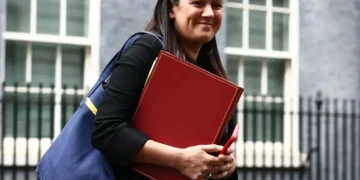Spectator editor Fraser Nelson has warned the sale of his magazine and Telegraph Media Group to an Abu Dhabi-backed investment firm would have a “very profound impact” on the UK press.
Nelson said the Redbird IMI deal would “probably not be the last such acquisition” if it went ahead as if the Government approves a deal backed by the Emirati government “then why not the Chinese government? Why not the Russian government?”
Speaking at the first Lords Communications and Digital Committee hearing in a new future of news inquiry on Tuesday, Nelson said “previously foreign governments or their investment proxies would not seek to buy publications, but now they are seeing if they can get away with it and it looks like there’s a reasonable chance of that happening.
“That would have very big implications for the trustworthiness of news, for the future of news. I don’t think any democracy in the world has seen one of its newspapers sold to a foreign authoritarian government.”
He added: “I think that would have a very profound impact were it to go ahead because it probably would not be the last such acquisition.”
The Government is examining the proposed purchase of The Telegraph and The Spectator by Redbird IMI, a joint venture between US investment firm Redbird Capital and International Media Investments led by ex-CNN president Jeff Zucker. IMI, which is led by UAE deputy prime minister and Manchester City owner Sheikh Mansour bin Zayed bin Sultan Al Nahyan, owns about three quarters of Redbird IMI.
Redbird IMI got around the auction process being led by Lloyds Banking Group by agreeing a deal with former Telegraph owners the Barclays to pay back their debt and then take over the newsbrands.
Nelson has written several columns for The Spectator, which he has edited since 2009, sounding the alarm about the deal. The Telegraph’s editorial leadership has been less explicit but has run several front-page stories criticising the deal and has encouraged readers to share their thoughts with the Government consultation.
A poll in November found that more than two-thirds of Telegraph subscribers said they would be less likely to renew if the UAE-linked deal went ahead.
A contrasting view came from former Times leader writer Simon Nixon who wrote in The Independent this week that there was “nothing unusual” about a private equity deal in which Mansour’s IMI would be passive investors and opposition is “clearly ideological”.
Similarly former Telegraph chief political commentator Peter Oborne wrote that there was already editorial interference under the Barclays – citing his resignation over “nothing unfavourable of any substance” being written about HSBC for years for fear of losing its advertising.
Nelson told members of the House of Lords on Tuesday he “wouldn’t mind there being a law passed whereby foreign governments aren’t allowed to buy British newspapers or magazines”.
Noting that foreign governments had seemingly moved on from buying shopping malls and nuclear plants to media organisations, he added that “when that happens, then you will find a significant chunk of your country’s media in the hands ultimately of countries with no tradition of free speech at all. How will they use their influence? How will they use those powers?
“I don’t believe there can be such a thing as editorial board protection. I don’t think any of these has ever really worked.”
Zucker has proposed creating an editorial advisory board to guarantee the independence of The Telegraph – although not The Spectator.
“It is impossible, I think, to really make a news organisation independent of the organisation that actually owns it. You can’t be independent of your owners. You can try a fig leaf. But I think we are facing unexpected peril for free press in this country… if right now we say yes to the Emirati government then why not the Chinese government? Why not the Russian government?
“So unless you’ve got rules in place saying which parts of our country should or should not be for sale then we do leave ourselves vulnerable because we tend to be quite an open country generally to foreign investment.”
He noted his criticism applies only to foreign governments, not foreign individuals or companies, pointing to Japanese company Nikkei’s ownership of the Financial Times which he said has “never been better”.
Subscriptions ‘transformed’ Spectator’s business model
Separately Nelson discussed how The Spectator’s business model has been “transformed” by subscriptions.
The latest ABC figures for The Spectator show it had an average global circulation of 109,180 in 2022, of which 91% (99,762) were paid subscriptions. Ten years earlier, it had a total circulation of 63,613 of which 58% (36,657) were subscriptions.
“The Spectator has been quite lucky in that we’ve doubled our subscriptions in a market down by two thirds,” he said.
“Advertising’s gone down from about 27% of our revenue to about 8% of our revenue and consumer money – the money we get from subscriptions and the newsstand – has risen to about 85%.”
He added: “I would suspect that probably people are paying more money now for content, for news, than they’ve ever paid before. Lots of people are subscribing to publications.
“The Spectator’s business model has been transformed by the willingness of people to subscribe and the ability of technology to come and take what The Spectator does to other people who would never have encountered it otherwise – mainly on social media, on search. Social media has become a new WH Smith – it used to be the case you’d pick up a publication and read it to see if you liked it. Now you can sample its wares with a few clicks.
“So overall technology I think has – play it right and it could be a tremendous boon to publications. The Times is now making profit that hasn’t happened for decades. So it’s not all doom and gloom and despair.”
BBC is ‘competitive danger’ online
However, Nelson did point to the challenges posed by the “leviathan” BBC’s free distribution of news online, especially to local news providers.
Although describing himself as a “great admirer” of the BBC, Nelson said: “Whether it needs to hold a massive market share in all of these new areas, I’m not sure. Does it need to be competing in podcasts so aggressively – would it really hurt to leave independent players to to see what they can do?… Does the BBC need to be the number one player in the written word as well as the broadcast word? I mean, anytime it sees a new kind of medium open up it wants to dominate and it does a pretty good job in that.
“So I would think it’s desire for expansion combined with its point blank refusal to monetise the way that everybody else does, I think is a bit of a competitive danger…”
BBC director of nations Rhodri Talfan Davies responded to this type of criticism last year by saying there is no evidence the BBC “crowds out” local competition through its online activity.
The post Telegraph: Fraser Nelson warns against allowing foreign states to own UK media appeared first on Press Gazette.





























